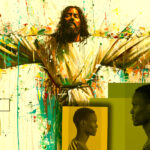This is the final article in our series on comparing a theology of the cross with the theology of glory. The first showed that true faith rests in Christ crucified, not human glory; then, in the second, we explored how this faith forms a Christ-shaped life. This article, the third and final in the series, points ahead to our hope; to our future glory shaped by the cross and secured in Christ. Put another way, I’m going to argue that true Christian hope follows the crucified Christ to eternal glory.
The African Church needs a glory-shaped hope.
The African Church does not merely need a cross-shaped faith or a Christ-shaped life. It also needs a glory-shaped hope. Africans need a hope formed not by worldly triumphs or emotional highs, but by the promise of resurrection after suffering, exaltation after humiliation, and eternal glory through union with the crucified and risen Christ.
A Church Chasing the Wrong Glory
In our churches today, we love to sing songs of victory. And rightly so. Christ is risen, death is defeated, and his people are more than conquerors. Yet beneath the surface of that triumph lies a dangerous distortion: the idea that glory comes now—without suffering, without the cross, without waiting. It is a theology of glory masquerading as Christian hope. But the true Christian hope is not triumphalism. It is a glory-shaped hope for a cross-bearing church.
True Christian hope is not triumphalism.
At the heart of biblical Christianity lies the paradox of glory through suffering. The road to life runs through death. The crown follows the cross. This is the shape of Christian hope. It’s not immediate or triumphalist. Christian hope patiently waits through trials with eyes fixed on the risen Lord.
Yet, this is exactly what the theology of glory denies. Whether through prosperity preachers who claim your breakthrough is now, or revivalists who promise anointed power detached from Christ’s sufferings, there is a rampant distortion of biblical hope. We are being sold a resurrection without death, a kingdom without a cross, and glory without God.
Paul writes, “we are children of God…and if children, then heirs—heirs of God and fellow heirs with Christ, provided we suffer with him in order that we may also be glorified with him” (Romans 8:16-17). This conditional phrase is not a denial of grace; it is a reminder of the shape of grace. The path of the Christian is not a detour around suffering—it is a road that follows Jesus through it.
False Hope Makes Fragile Christians
The danger of the theology of glory is that it makes Christians unprepared for reality. It sets up expectations that God will always heal, always prosper, always promote. But when cancer lingers, jobs are lost, or prayers seem unanswered, faith collapses under the weight of misplaced hope.
This is why many believers are discouraged, defeated, or disillusioned.
This is why many believers are discouraged, defeated, or disillusioned. They were promised the fruit of glory without the root of suffering. But Jesus never offered such hope. He called us to take up our cross and follow him (Luke 9:23). He promised that in this world, we would have trouble; but also that he has overcome the world (John 16:33).
True Christian hope is not an escape from pain. It is endurance through pain, with eyes fixed on a coming glory that makes present suffering “not worth comparing” (Romans 8:18). This is not resignation. It is resurrection-shaped hope. This is how Paul encouraged the new believers in Acts 14:22, “Through many tribulations we must enter the kingdom of God.” The cross-bearing church does not deny suffering; it understands it as the appointed road. Why? Because Christ walked it before us.
Union with Christ: The Ground of Our Glory
The theology of the cross, by contrast, shows us how to hope. Our union with Christ includes not only justification and sanctification, but also glorification (Romans 8:30). But in God’s wisdom, glorification comes at the end. When we are united with Christ, his past becomes our past: crucified with him; his present becomes our present: hidden with him in God; and his future becomes our future: glorified forever (Colossians 3:3-4).
The theology of glory seeks glory in the fading present. But the theology of the cross waits in enduring hope, trusting in a glory still to come. A theology of glory wants it all now—heaven without the narrow road, resurrection without death, celebration without perseverance. But such glory is false because it bypasses the very pattern God has ordained for his people.
The prosperity gospel’s version of glory is too small, too soon, too self-centred.
Our hope is not found in circumstances but in union with Christ. Because we have died with him, we shall also live with him (2 Timothy 2:11). Because we suffer with him, we shall also reign with him (2 Timothy 2:12). “Though our outer self is wasting away, our inner self is being renewed day by day. For this light momentary affliction is preparing for us an eternal weight of glory beyond all comparison” (2 Corinthians 4:16-17). Our hope is not that our circumstances will always change. It is that we will be changed, transformed into the image of Christ and raised in glory at him coming (Philippians 3:20-21).
This is the hope the prosperity gospel cannot offer. Its version of glory is too small, too soon, too self-centred. But the biblical gospel promises something better: the glory of God in the face of Jesus Christ (2 Corinthians 4:6); a glory we are being transformed into, even now (2 Corinthians 4:18).
Such hope gives birth to endurance; endurance produces character; and character reinforces hope (Romans 5:3-5). This is the cycle of Christian maturity. It is how the Church grows deep roots and a strong witness in a suffering world.
What Does This Glory-Shaped Hope Look Like?
The cross-bearing church must hold fast to this glory-shaped hope. In a continent where many are tempted to despair, or to grasp at quick fixes and spiritual shortcuts, we must point one another to the final horizon: the day when faith will be sight, and Christ will be all in all. In the meantime, what does this glory-shaped hope look like?
Christ is worth more than grades or gifts.
It looks like lament that still believes. Believers crying, “How long, O Lord?” while still confessing, “I will rejoice in the Lord” (Habakkuk 3:17-19). It looks like endurance in suffering: pastors in rural villages preaching faithfully without fanfare; mothers praying over sick children with tear-stained faith; and students saying no to corruption because Christ is worth more than grades or gifts. It’s joy even in weakness. Not because we love pain, but because we know God’s power is made perfect there (2 Corinthians 12:9). It looks like bold evangelism in hostile places, because the hope of the resurrection overcomes the fear of man. It looks like faith that dies well, because to live is Christ, and to die is gain (Philippians 1:21).
Africa Needs This Kind of Hope
A continent ravaged by conflict, corruption, poverty, and false teaching does not need more promises of easy victory. It needs a robust, resurrection-shaped hope. It needs a vision of glory that passes through Golgotha. And it needs Christians willing to bear the cross today because they are certain of the crown tomorrow.
A continent ravaged by conflict and poverty doesn’t need more promises of easy victory.
This is what the theology of the cross gives us: not less glory, but deeper glory—glory that cannot fade, because it flows from the wounds of the Lamb. It is the glory of a city where God will dwell with his people; where “He will wipe away every tear” and “death shall be no more” (Revelation 21:4). Let us therefore be a church marked not by spectacle, but by substance. Not by hype, but by holiness. Not by fleeting emotions, but by eternal expectation. Anchor yourself in the One who was slain and with whom we will reign forever (Revelation 22:3-5).
As African believers, let us hold fast to the gospel that prepares us to suffer well, to endure faithfully, and to hope boldly. Because in the end, those who sow in tears shall reap with shouts of joy (Psalm 126:5). And those who carry a cross will receive a crown. Our hope is Christ. And he is worth it.














